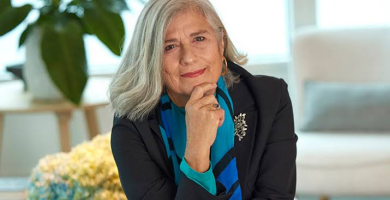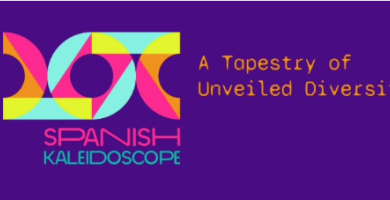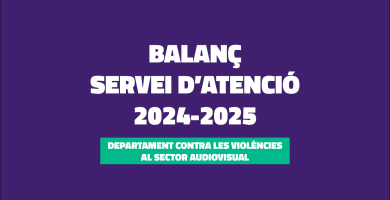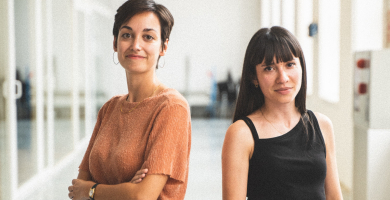
FESTIVAL RETEENA: “Right from the beginning we were sure that we really wanted it to be a young festival and that for this we had to listen to and take into account what our target audience wanted.”
This month we interview Maria Castellví and Clàudia Mera, directors of the Festival Reteena, a festival for young people, created by young people and which this year received the City of Barcelona award in the Audiovisuals and Audiovisual Culture category.

When and why did you decide to create a film festival devoted to young people?
Maria: It arose from our conversations at university. We studied audiovisual communication together at the Pompeu, we went on an Erasmus together and we ended up working in an audiovisual production, distribution and communication cooperative. Clàudia is devoted to the distribution and I’m now doing the PhD on youth and social media. At that time I also began to do audiovisual education workshops. On sharing our projects a little, and also reflecting on the panorama of festivals in Barcelona and Catalonia and seeing that many were interested in attracting a young audience and scheduling morning sessions for schools or activities with a strong focus on formal education, we saw that there was a gap for an audiovisual festival as a leisure and entertainment proposal geared directly toward young audiences and also organized directly by young people.
The festival also takes place thanks to a group of young volunteers who help you to choose the schedule. How did this idea arise? And how do you select the young people to participate?
Clàudia: Right from the beginning we were sure that we really wanted it to be a young festival and that for this we had to listen to and take into account what our target audience wanted. We decided to create a group of about six people between 16 and 22 years old with which we meet to discuss which activities and films we want to schedule. They help us to decide on the schedule, so that it’s really geared toward this audience and is interesting for them. We have an annual open call in the summer. And in September we begin to work with this group which has different profiles and ages. We always try to ensure that they are also from different audiovisual schools or universities or that they are taking different baccalaureates in order to have different opinions. From September to December we meet to discuss the schedule, but we also have a training part. For example, we have professionals like Helena Alabart from Docs Barcelona who talks to us about the production of events and in particular festivals, and also the Federation of Film Clubs of Catalonia on how to organize and discuss a film talk.
Apart from the screenings you also organize other activities such as masterclasses and round tables. Do you think that it is not only important to show films but also to have activities beyond directing or performing, for example other aspects which are less well known about the world of films?
M: Starting with the first edition, we saw that what really interested them, apart from discovering films, new authors or being able to screen their first works, was to be able to do practical workshops, touch the camera, experience and test things that maybe in the film schools they don’t have the opportunity to do, such as dubbing, sound, photography,... And also, to be able to organize talks and round tables, inviting new local talents who cover subjects such as, this year, the talk on new queer fiction. Inviting people from the community who are beginning to work and who can offer their first-hand experience. In the masterclasses, even in the most traditional ones such as the one we hold each year on editing with AMMAC, we like the person giving the session to be very honest about the work routines and on explaining how they started out in their career, in this case in the world of editing. People in the audience who want to devote themselves to this also ask questions, such as: Are you self-employed or do you work for a production company? How did you begin? Which programs do you use? They are very easy-going and experiential talks and activities for young people who need advice or real experiences.

Would one of your activities, the young audiovisual lab, come within this?
C: Yes. We’ve been holding it for two years with Nadir, an organization which also offers audiovisual education in Barcelona, with the aim of giving these young people the opportunity to develop their first project. The projects we choose tend to be from very young people, between 15 and 19 years old. Normally it’s the first or second short, video clip or audiovisual piece that they are creating. And thanks to Nadir they are given advice about how to produce it, direct it, approach it in order to bring the project that they have in mind to fruition. We have the mad talent shorts session, which we always want to include in the festival, if the shorts are actually made.
Apart from films, you also have Photo Reteena, an online show of emerging talent. How did this arise?
M: It began in 2020 with the pandemic and when we thought about what we would do if Reteena couldn’t be held on site. It emerged very spontaneously on talking with a group of young people. We always want the Fabra i Coats foyer to be a living space where you can display audiovisual works from different fields. We collaborate with the Joso school, for example, and they always display end-of-course projects on the creation of characters or videogames. We’ve also collaborated with photography schools. And as the 2020 festival was almost completely online, except for a few screenings at the Filmoteca, we decided that we wanted to maintain this spirit of generating a community among young creators. The easiest way was to hold an online show on the festival’s website. The response was incredibly good and surprised us all a great deal. We received over 300 proposals from people who voluntarily shared their photographs. Indeed, we repeated it this year, despite the fact that we were able to hold the festival on site, which is what we want. The idea is that young people who are interested in audiovisual also want to meet up, do networking, exchange projects,...
C: It’s also a very creative generation which consumes audiovisual content so it’s very important to give them a space where they can display and give visibility to their work, because this validates it. That’s why we decided to maintain it. On site, we don’t have enough space in the Fabra i Coats to display 500 photographs, two or three per person. Also so that they can get to know each other, so that they can say that their photos were in this festival. That’s an important step, both if it’s your hobby and if it’s the beginning of your career.

Last year was your fourth edition. What’s your appraisal of this last edition in December, after the online one in 2020? Were you able to do everything as you wanted?
M: It was the most complicated one. As regards everything, expectations, logistics. As the 2020 one was in such a strange context, we were emotionally more prepared. If we can’t do it we don’t, but if we can we go ahead. However, in 2021, in December it was already becoming urgent to get back to normal and to be able to resume the festival as we had left it in 2019 and this wasn’t possible. I don’t know whether it ever will be, but I hope so. But, in any case, it was very difficult to communicate the proposal, to understand how young people are at the moment, what’s going on inside them, what they wanted to do. It caught us just prior to the new wave. We think it’s very positive to go back to an on-site format. It’s also the first year that we’ve been in Cines Girona with showings in a commercial cinema.
C: The response wasn’t bad, but it’s true that it’s a very complicated moment for young people. Many people began to study in the middle of the pandemic, and they haven’t even had the opportunity to meet their fellow university and baccalaureate students. They’ve been very confined. If I’d been a teenager in the middle of the pandemic, I don’t know what I’d be like or how I could focus on the future and on what I want to do with my leisure time. The response was much weaker than the second edition. There weren’t many proposals in the third edition, as you could hardly leave home. We did have a big online audience. We held all the activities on YouTube and also debates and round tables using Zoom. And they went very well. We hope that next year really will be post-pandemic and that we can do it all 100% and the people will have been able to have a whole normal year. I’m also a film distributor and I can see that audiovisual consumption and habits have changed enormously. We’ve become used to consuming everything at home. At the beginning it was compulsory, but in the end the platforms have taken advantage of this. All the content is there and people are finding it difficult to go back to the cinema. We have to see how things evolve, be patient and hope.
M: The young people from the Reteena team this year, five girls and one boy, wonderful people, have led the way and it’s very motivating to see how thanks to forming part of this team they’ve been able to meet, to connect a lot, to grow ... Each of them is studying in a different training centre and they’ve been able to begin projects, exchange experience and it’s been very positive for them to be able to have face-to-face meetings and experience the festival. Although the public response isn’t the same, for all festivals, because it’s something that we share with people from the industry.
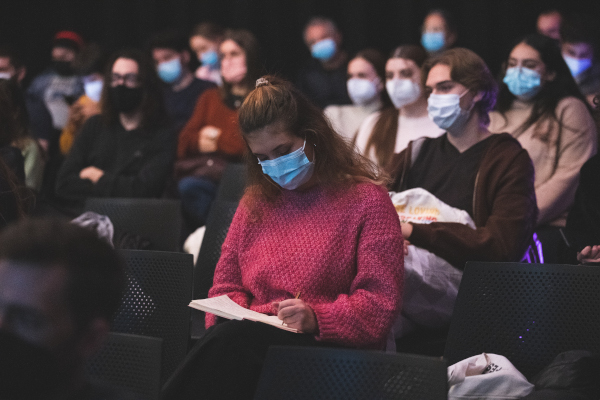
Apart from the festival, through the Reteena Audiovisual Association you collaborate with other festivals. What do you do as well as Reteena?
C: Apart from holding the festival in December, throughout the year we try to have other proposals to keep the community alive. The partnerships with the different cultural proposals that exist in Barcelona and Catalonia are very important for us. One of our projects is the young jury in the framework of Docs Barcelona and in September also with Serielizados. We organize the call and give impetus to a group of young people who are responsible for viewing audiovisual pieces within the framework of these festivals and we support them on analyzing them and deciding which can have the most value for a young audience, which can be more interesting, which has a subject which will reach them more. At Reteena we like to be able to give this reward to view these pieces and act as motivators, with these young people who accompany us, for certain audiovisual products which have less visibility.
We hold a workshop which we love and we’re really proud of having begun it four or five years ago with the In-Edit team on two or three weekends to make a music documentary short. It has a theoretical training part on music documentaries and on how to write a script and the production part on which we have worked with different music festivals such as Cruïlla, Say It Loud, La Mercè. In these festivals we record the piece which will then be seen in In-Edit.
We also hold a workshop in Andorra in the Ull festival. One year we did one for an adolescent audience on how to produce shorts. And this year we’ve also begun to organize children’s workshops, for a younger audience than ours. We’ve also collaborated with Mi Primer Festival. We try to keep active and always design the proposal precisely for the festival with which we are working. Not just to repeat the same workshop, but always to think of the context, the framework and the positioning of that festival in order to offer an activity of either supporting a screening, creating practical training... Always thinking of the essence of the festival, so that it makes sense for us and for the festival team.
M: These collaborations make a lot of sense. From the first edition we assessed our festival using several techniques and we were very surprised, and this is still the case, that from among the attendees of Reteena almost 90%, mostly film and audiovisual students, have never been to a film festival. Reteena is the first audiovisual festival that they attend. This surprised us a lot because it’s really a niche audience which could be interested in the proposals offered during the year in the city. With this Reteena label, we try to create an itinerary between the different festivals, because maybe the communication or the proposals don’t target these young people or they think that, if you’re not an expert, you can’t attend. Through these activities they begin to feel that they are invited to these festivals.
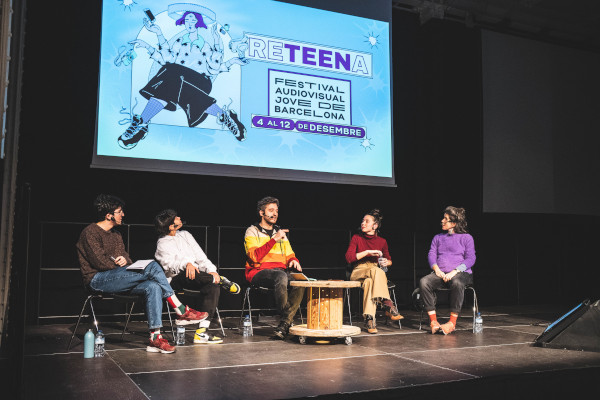
Congratulations on winning the City of Barcelona Award in the Audiovisuals and Audiovisual Culture category. What does it mean for you to receive this award?
M: We are very pleased, but also surprised. For us it’s incredible that the jury thought of Reteena, assessed it and, unanimously, decided that we deserved this award. We’re really grateful because we’ve had a very complicated year. Reteena is an emerging project which has only existed for four years. We organized the first edition with nothing, with the help of the Fabra i Coats and ICUB which allowed us to hold it there, but with our savings and collaborators who, with great generosity, have been giving workshops and masterclasses since the first year, and helping us to achieve the rights of films that we wanted to screen. To think that that’s how we began and that then, little by little, thanks to the support of ICUB, ICEC, of the collaborators who are still with us, we’ve been able to hold four editions,... we find it incredible to be given this recognition. And it helps us a lot, because it’s not just a few pats on the back and “very good work”; rather, it gives us a boost.
C: It gives us the moral support that we need from: “The project is very good and you must continue”. Those of us who work in culture know that you have to be very eager and to put in a lot of hours to be able to go ahead, to have a good proposal and for everything to come out alright. There are times when you wonder whether it’s worth it. And this encourages us to continue and we also hope that it will open new doors. For example of sponsors, because we never obtain private funding. Luckily, we have public funding from ICEC and ICUB and we’re really grateful. We hope we can hold onto it. We need more financing. Let’s see if this award helps us to make the project more visible, to consolidate the proposal even more and for Reteena to have more years of life.
What are the main difficulties you encounter on implementing a project like this? We suppose that funding is the most important.
M: It’s true that funding is the most obvious. We see other festivals which disappear in the third edition because they are unsustainable. These projects that you do in your free time are very complicated. Even those which are really consolidated, you know the teams behind them, and you think: “how can so few people with so few resources create such a big project?”. Apart from this, our challenge is to continue to connect with our target audience and to offer a meticulous schedule, which attracts the attention of this young audience and which is interesting. This means that we have to keep up to date. And also, not lose this horizontal perspective.





